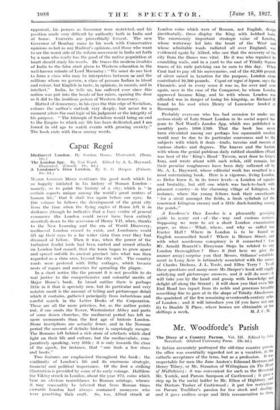A Diehard's Dicta
My Working Life. By Lord Sydenham of Combe. (John Murray. 21a.)
THERE is an element of austerity about Lord Sydenham's recollections. We should like to hear something of his feelings and emotions as well as of his conclusions, above all we should like to see the great men with whom he worked and disputed, more definitely characterized. Such reserve leaves the curious reader—and all present-day readers are curious—with a sense (jiving snubbed. But if the reader is brave as well as curious and can endure a tacit reproof, his patience will be rewarded. There is—there could hardly fail to be—a great deal of solid interest and instruction in a true account of the working hours of a distinguished and industrious public servant.
Brought up in a Lincolnshire rectory by parents whose traditions were military and scholarly, lie went through the ordinary educational mill without any extraordinary success until a taste for engineering and a boyish interest in things military took him to Woolwich, hence he passed out first with ten prizes and the Pollock Gold Medal. Of the twelve next Years of subalterrkhood, nine were officially given to teaching geometry and engineering. Long holidays, and the spare time a hard-working man knows how to make, were crowded with other interests. Music and science were his recreations, writing both in periodicals and in book form on subjects cognate to his work and outside of it became his serious hobby, while the subject of Imperial defence filled up all the intervals f his thinking. When in 1880 his military promotion fell due, e left Cooper's Hill and returned to soldiering, being ordered rat to Bermuda and then to Egypt. Later on we find him nee more civilly employed as secretary to a small committee °Tined in connection with the Colonial Office and the War
ee, to deal with questions of Colonial defence. It was the
rid duty " to study the local conditions of all colonies oil to draft and print recommendations for discussion by the nunittee:' It was to the golden opinions won by seven years of this work, bringing him as it did into close association with the Colonial Office,that Lord Sydenham owed his appointment to the Governorship of Victoria. He only held the post for two years, but those two years completely changed his political outlook. Henceforth he was to be a convinced, even an ardent, Conservative. "The faith of a Liberal was shattered, and the phrases which I had accepted as principles lost all actuality. I had seen democracy—considerably more advanced than that at home— in fUll operation, and my confident hopes of govern- ment 'by the people and for the people' faded away."
A telegram from the Prime Minister requiring his services on a committee of three to advise on the reorganization of the War Office involved a sudden departure from Melbourne. The new work offered to him was one of immense importance, but he evidently left Australia with egret, and he writes ruefully that "when I returned home no one except the King, who questioned me closely, showed the smallest interest in the political situation in Australia."
Perhaps the most striking chapters in this book of recollec. tions concern India. In 1907 at the age of 59, Lord Sydenharq was made Governor of Bombay. On the first night of his arrival he had a dinner-party at Government House, to which he had directed that as many representative Indians as possible should be invited. " There were, it seemed to me, greater divergences of racial types than I had found at three inter- national gatherings in Europe." The sense that India is not one country and cannot rationally be governed as such never left him, and was the cause of much friction between him and the Central Government on the subject of decentralization. India should consist,he thought, of a number of administrations autonomous in provincial affairs. It could not, he was certain, be adequately governed from " a remote hill top " like Simla. The severe—hut in no possible sense cruel-- manner in which he checked a rebellion instigated by Tilalc whom he imprisoned, turned Lord Morley from a friend into an opponent, his powers as Governor were restricted, and his position made very difficult by aUthority both in India and at home. Converts are proverbially fervent. The new Governor of Bombay came to his work with Conservative opinions as hot as any Radical's opinions, and those who want to see the worst side'd the 'reform movement in India set forth by a man who really has the good of the native population at heart should study his words. He traces the modern Troubles of India to the false start given to Western education in the *ell-known minute of Lord Mneaulay: "We must do our best to form a claSS who may be interpreters between us—and the millions whom we govern, a class of persons •Inciiin in blond and colour, but English in taste, in opinions, in mornlS, and in intellect." India, he tells us, has suffered ever "since this notion was put into the heads of her rulers, opening the door as it did -to the insidiouS poison of Western democracy.
Hatred of deinocracy, in his eyes the thin edge of Socialism, colours the author's • outlook Very deeply, but never for a moment alters•the cool logic of his judgment Or the integrity of his purpose. " The triumph of Socialism would bring an end to the Etupire to which niy life has been dedicated, and I am forced in old age to watch events with growing anxiety." The -book ends with these uneasy words.



























































 Previous page
Previous page